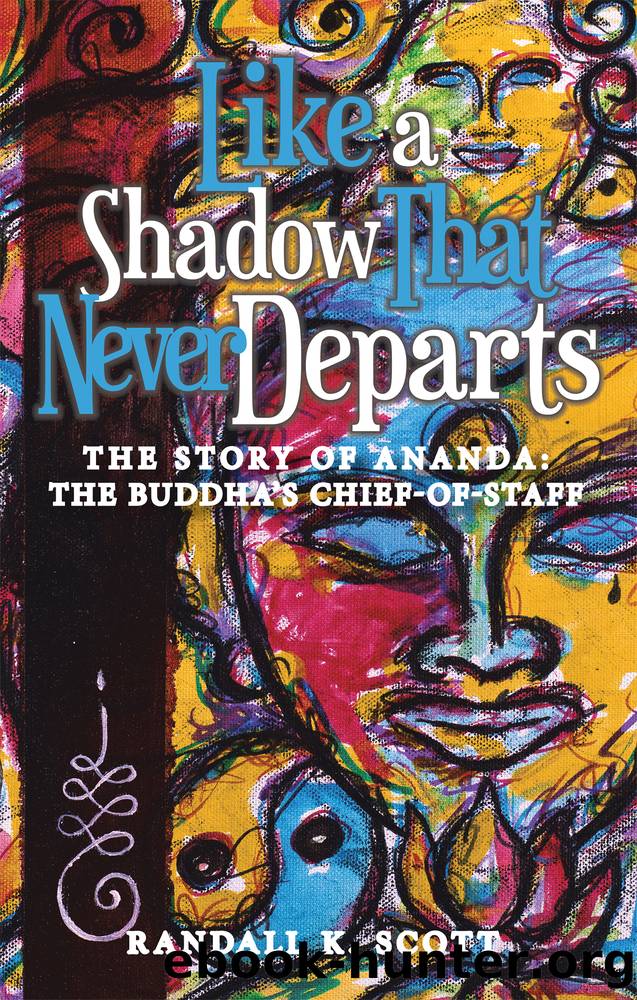Like a Shadow That Never Departs by Randall K. Scott

Author:Randall K. Scott [Scott, Randall K.]
Language: eng
Format: epub
ISBN: 9781663230447
Publisher: iUniverse
Published: 2021-12-01T05:00:00+00:00
8
The First Council Is Planned
The Buddhaâs parnirvanization was a serious test for the senior monks in the Order. The rivalries and power struggles in the sangha that the Buddha had struggled to control were now in the open. Just one week after the Buddhaâs parinirvanization, elder Mahakassapa heard arhat Subhadda give a speech to the assembled monks. Earlier, the weak, but still commanding Buddha overruled Anandaâs objections and agreed to answer questions that Subhadda had about Buddhism. Subhadda, who had been so interested in learning from the Buddha a week ago, now seemed to coldly dismiss the Master: âSurely, friends, do not grieve, do not lament, itâs good riddance for us. We were annoyed by that great ascetic, who told us what is proper and is not proper. Now we can do what we wish to do and not do what we donât wish to do.â323
Subhaddaâs attack on the Buddha seems particularly vicious and unnecessary. The Buddha was in his final moments of life; but he helped Subhadda overcome his obstacles to enlightenment; allowing Sudhadda to quickly become an arhat. Subhadda was the last of the Buddhaâs great disciples. He could have been a respected elder. Why did he turn on the Buddha and disparage him?
This is another example of a senior monk, an arhat, who is supposedly enlightened, exhibiting very little enlightened behavior. The account of this incident notes that Sudhadda âhad become a monk in old age.â324The relevance of Subhaddaâs age is not immediately clear, unless the chronicler intended to lessen the sting of Sudhaddaâs comments by inferring, perhaps, that Sudhadda was old and addled and did not understand what he was saying. It also should be noted that Ananda tried to prevent Subhadda from talking with the Buddha. Perhaps Ananda had a better insight into peopleâs true motives than the Buddha. Ananda might have sensed Subhaddaâs treachery and was trying to protect the Buddha.
Whether he understood the significance of his words or not, Subhadda was suggesting that the sanghaâs successful discipline and structure instituted by the Buddha should now be abandoned. Kassapa knew if Subhaddaâs point-of-view was adopted, it would be the end of the Order.325The sangha was being weakened by these internal battles. Kassapa mulled over the remarks by Subhadda and saw that an official, authentic record of the Dhamma and Vinaya had to be established as-soon-as-possible to save the Order:
This setting which now exists is one where evil monks
think âthis word is from a teacher who has passed away,â
and when they get followers, the true dhamma may
disappear quickly. As long as the dhamma and vinaya
exist, there will be the word of a teacher who has not
passed away. Since the Blessed One said, âOh Ananda,
the dhamma and the vinaya that I have taught and made
known to you will be your teacher after my death,â
what if I should recite the dhamma and the vinaya so
that this sasana [teaching] will last for a long time and be
perpetual?326
Kassapa, now confident about what needed to be done, gave a rousing speech to the assembled monks.
Download
This site does not store any files on its server. We only index and link to content provided by other sites. Please contact the content providers to delete copyright contents if any and email us, we'll remove relevant links or contents immediately.
Machine Learning at Scale with H2O by Gregory Keys | David Whiting(4312)
Never by Ken Follett(3954)
Harry Potter and the Goblet Of Fire by J.K. Rowling(3856)
Fairy Tale by Stephen King(3392)
Unfinished: A Memoir by Priyanka Chopra Jonas(3388)
The Man Who Died Twice by Richard Osman(3077)
Will by Will Smith(2919)
It Starts With Us (It Ends with Us #2) by Colleen Hoover(2366)
Rationality by Steven Pinker(2363)
Can't Hurt Me: Master Your Mind and Defy the Odds - Clean Edition by David Goggins(2339)
The Dark Hours by Michael Connelly(2307)
The Storyteller by Dave Grohl(2234)
Friends, Lovers, and the Big Terrible Thing by Matthew Perry(2230)
The Dawn of Everything: A New History of Humanity by David Graeber & David Wengrow(2208)
The Becoming by Nora Roberts(2200)
The Stranger in the Lifeboat by Mitch Albom(2120)
Cloud Cuckoo Land by Anthony Doerr(2110)
Love on the Brain by Ali Hazelwood(2074)
Einstein: His Life and Universe by Walter Isaacson(2020)
